30 Pearls Of Wisdom By Cooks.
Nathan Johnson
Published
05/22/2022
in
wow
Tips to help your cooking out.
- List View
- Player View
- Grid View
Advertisement
-
1.
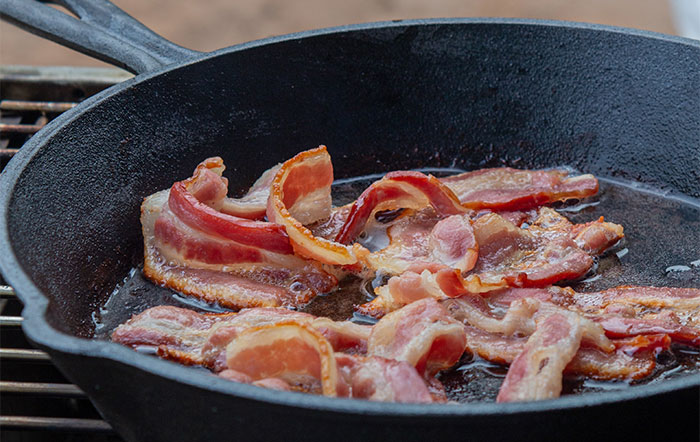 Don't cook bacon naked. (microwaving is fine)
Don't cook bacon naked. (microwaving is fine) -
2.
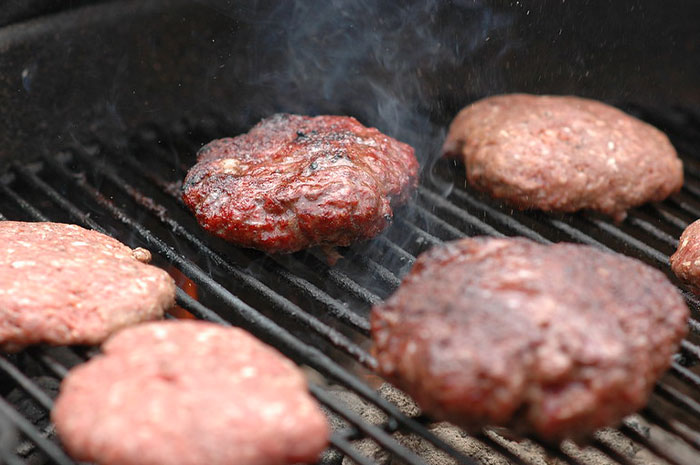 When you're cooking burgers with any method, make a small dent on the top of the patty (right in the center) with your thumb. When they cook, they'll stay completely flat instead of shrinking and getting very tall in the middle
When you're cooking burgers with any method, make a small dent on the top of the patty (right in the center) with your thumb. When they cook, they'll stay completely flat instead of shrinking and getting very tall in the middle -
3.
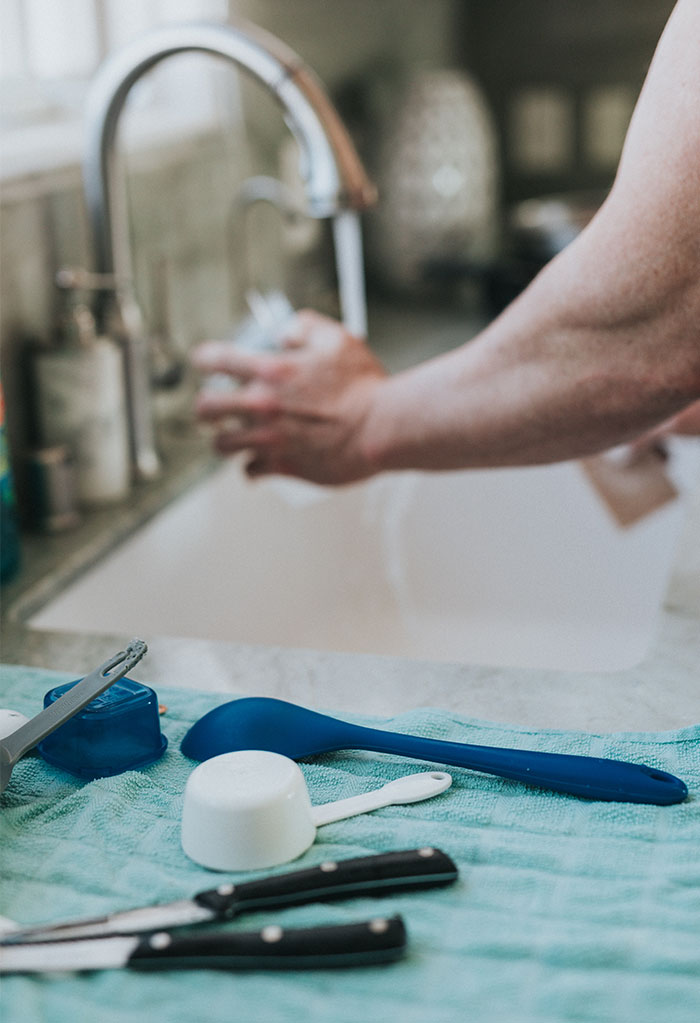 Clean up your station (or kitchen) as you go! You'll become so much more efficient in the kitchen, you'll always have space to work, and you'll have very little cleaning to do when you're finished
Clean up your station (or kitchen) as you go! You'll become so much more efficient in the kitchen, you'll always have space to work, and you'll have very little cleaning to do when you're finished -
4.
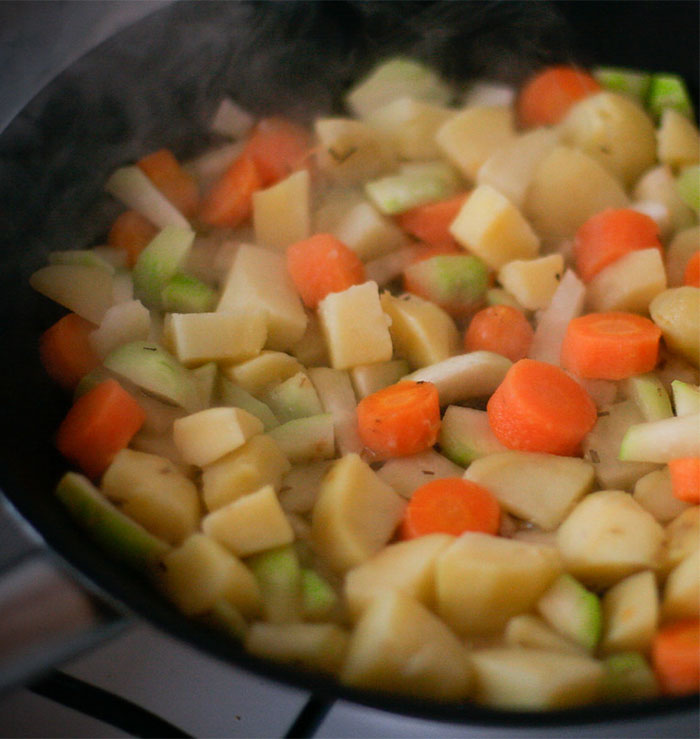 No matter what you're pan frying, don't crowd the pan. Get a bigger pan or cook them in batches, but the reason your potatoes and veggies aren't getting brown and crisp is because they're drowning in their own juice!
No matter what you're pan frying, don't crowd the pan. Get a bigger pan or cook them in batches, but the reason your potatoes and veggies aren't getting brown and crisp is because they're drowning in their own juice! -
5.
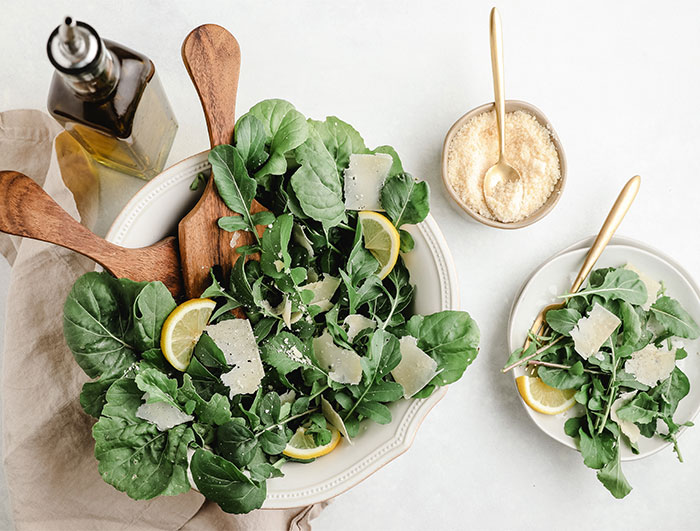 Salads are hard to make absolutely delicious without lots of dressing, but when you chop up juicy vegetables for a salad — like tomatoes, peppers, or cucumber — salt them before you add them to the salad. It'll remove some of the excess moisture so things don't get soggy, and it'll brighten up the whole salad without making it salty
Salads are hard to make absolutely delicious without lots of dressing, but when you chop up juicy vegetables for a salad — like tomatoes, peppers, or cucumber — salt them before you add them to the salad. It'll remove some of the excess moisture so things don't get soggy, and it'll brighten up the whole salad without making it salty -
6.
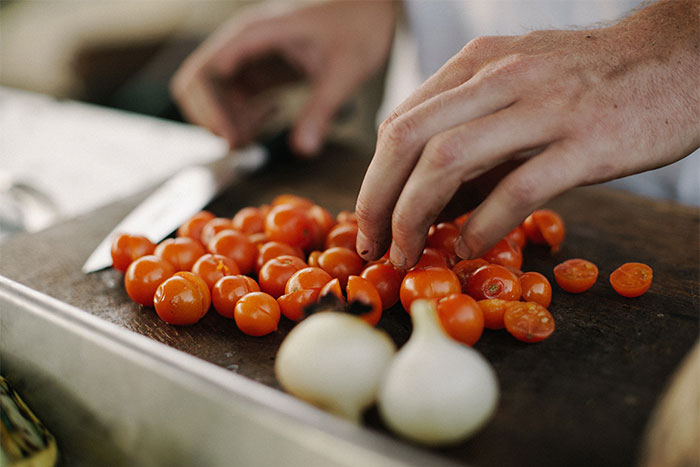 FLIP THE KNIFE OVER and use the back of it to shove stuff into a pot, not the sharp side
FLIP THE KNIFE OVER and use the back of it to shove stuff into a pot, not the sharp side -
7.
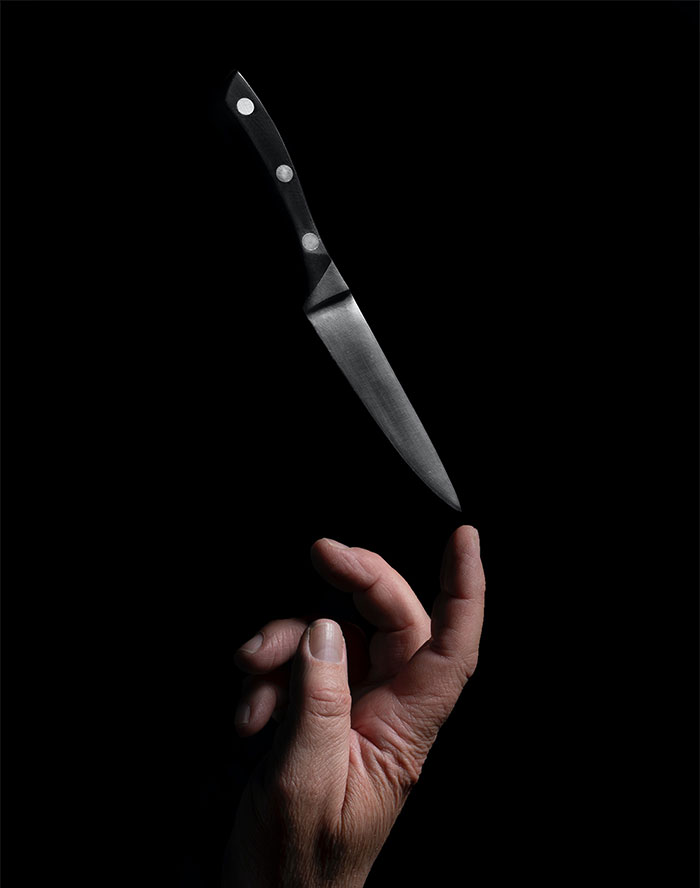 A falling knife has no handle. Forever true. Don't learn this one the hard way.
A falling knife has no handle. Forever true. Don't learn this one the hard way. -
8.
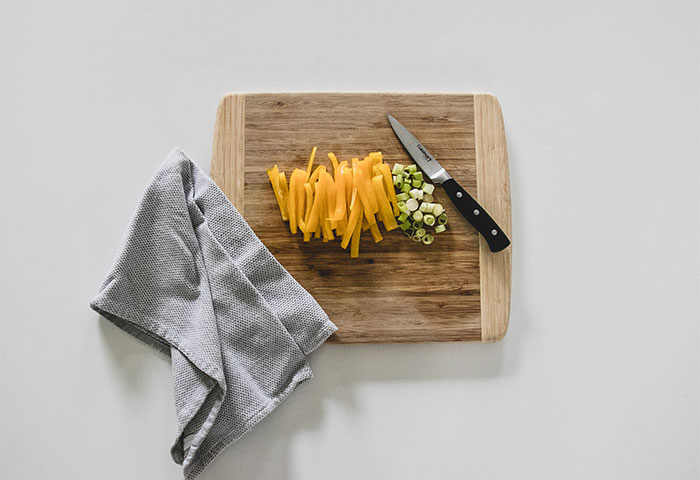 If your cutting board keeps slipping around the counter, put a wet towel or paper towel under it to keep it in its place. It'll make your chopping process much safer than it would be otherwise!
If your cutting board keeps slipping around the counter, put a wet towel or paper towel under it to keep it in its place. It'll make your chopping process much safer than it would be otherwise! -
9.
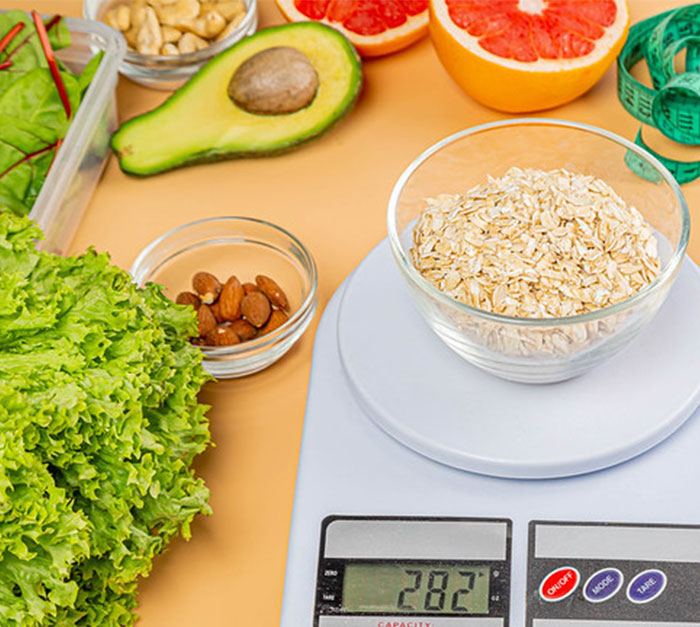 Use weight--not volume--to measure ingredients for baking.
Use weight--not volume--to measure ingredients for baking. -
10.
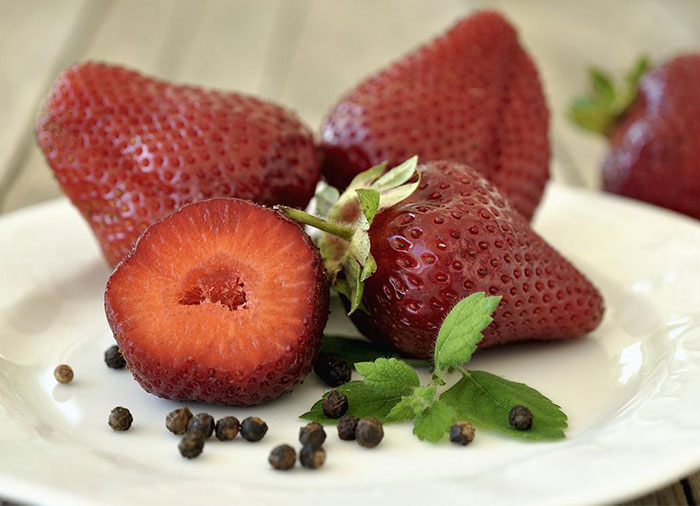 A chef taught me that sprinkling pepper onto strawberries makes them taste like strawberry-flavoured candy. I tried it and definitely recommend it.
A chef taught me that sprinkling pepper onto strawberries makes them taste like strawberry-flavoured candy. I tried it and definitely recommend it. -
11.
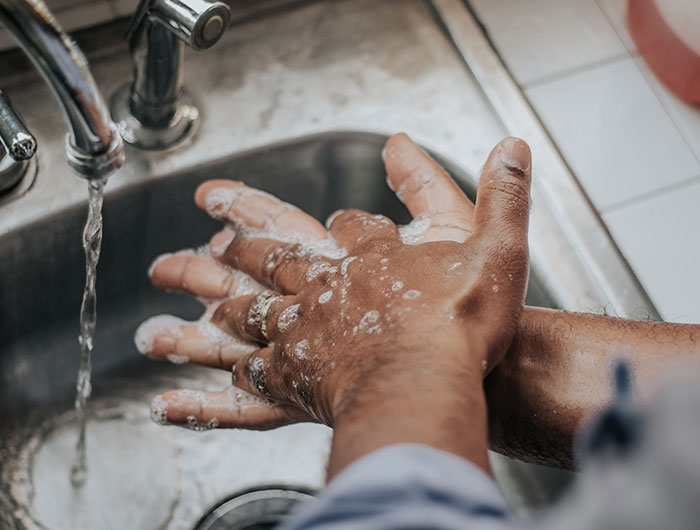 Wash your god damn hands
Wash your god damn hands -
12.
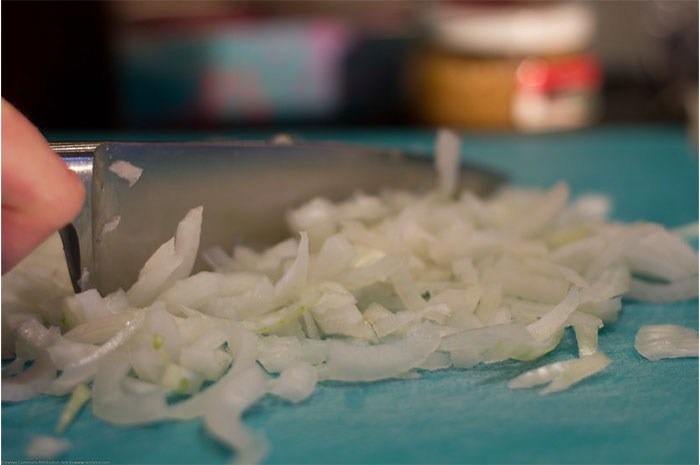 If you're using raw, chopped onions in a dish, soak them in cold water first to draw out some of that bite. It's a really small thing, but it can make a world of difference
If you're using raw, chopped onions in a dish, soak them in cold water first to draw out some of that bite. It's a really small thing, but it can make a world of difference -
13.
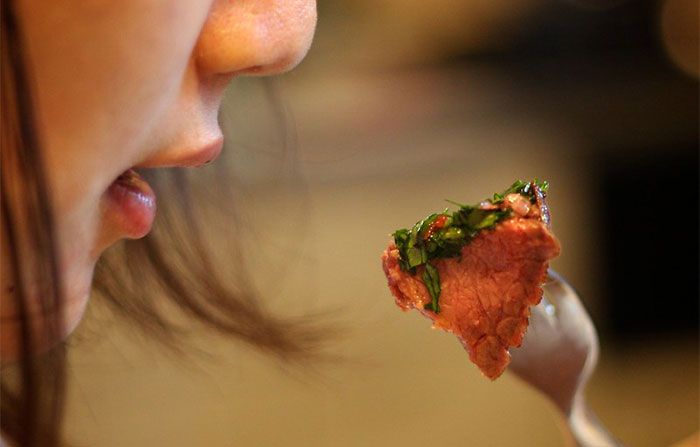 Always, ALWAYS taste your food while cooking. I always have like 5 spoons beside me while cooking. This allows you to accurately adjust seasoning, flavours, and cooking time. It is tough at first to know what to adjust, but you get better at it with time and it will really improve the quality of food you make (especially over-salting).
Always, ALWAYS taste your food while cooking. I always have like 5 spoons beside me while cooking. This allows you to accurately adjust seasoning, flavours, and cooking time. It is tough at first to know what to adjust, but you get better at it with time and it will really improve the quality of food you make (especially over-salting). -
14.
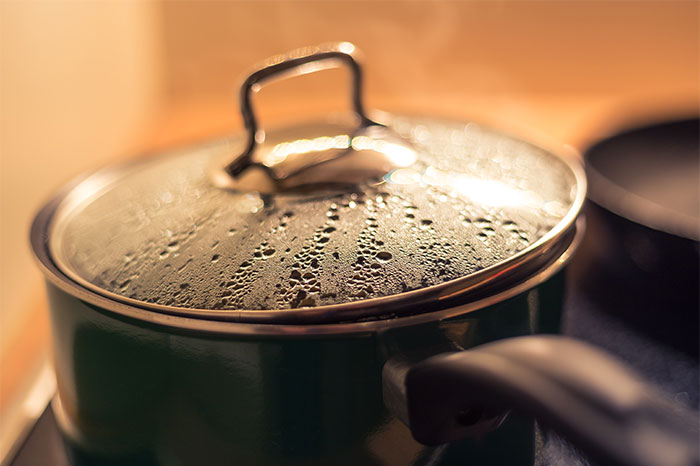 EDIT: YES I KNOW ABOUT RICE COOKERS AND I OWN ONE, BUT THIS IS STILL A TIP. Stop lifting the lid off of a pot of rice. Look at me. LOOK. AT. ME. STOP TAKING THE LID OFF THE GODDAMN RICE. YOU COMPLAIN ABOUT MUSHY OR CRUNCHY RICE AND IT'S EITHER BECAUSE YOU DON'T MEASURE OR YOU WON'T LEAVE THE LID ALONE. The steam cooks the rice, by taking the lid off you RUIN EVERYTHING **FOREVER**
EDIT: YES I KNOW ABOUT RICE COOKERS AND I OWN ONE, BUT THIS IS STILL A TIP. Stop lifting the lid off of a pot of rice. Look at me. LOOK. AT. ME. STOP TAKING THE LID OFF THE GODDAMN RICE. YOU COMPLAIN ABOUT MUSHY OR CRUNCHY RICE AND IT'S EITHER BECAUSE YOU DON'T MEASURE OR YOU WON'T LEAVE THE LID ALONE. The steam cooks the rice, by taking the lid off you RUIN EVERYTHING **FOREVER** -
15.
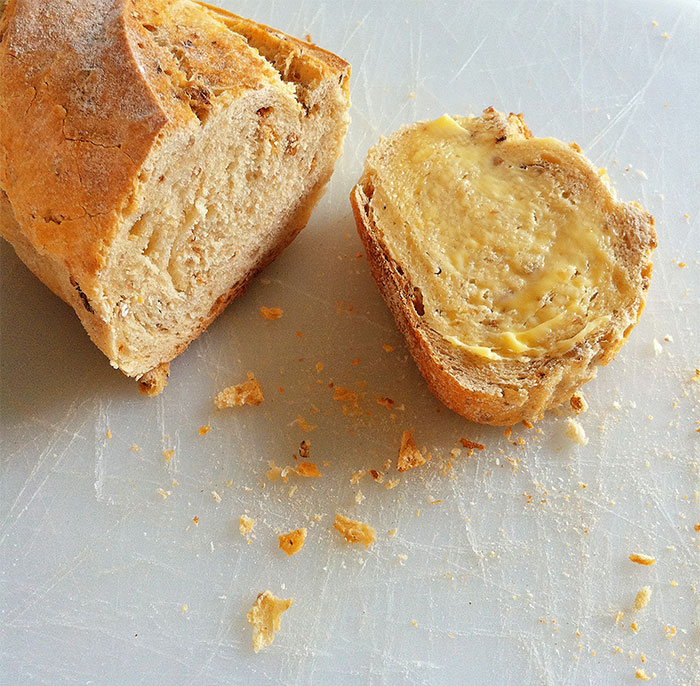 Cooking with softened butter and melted butter yield entirely differently results. For example, grilled cheese. If you butter your bread with softened butter instead of just melting the butter in the pan, you'll get a much more flavorful (and crispy) result. The fat solids emulsified in the softened butter make the bread crispier when it gets toasted over high heat
Cooking with softened butter and melted butter yield entirely differently results. For example, grilled cheese. If you butter your bread with softened butter instead of just melting the butter in the pan, you'll get a much more flavorful (and crispy) result. The fat solids emulsified in the softened butter make the bread crispier when it gets toasted over high heat -
16.
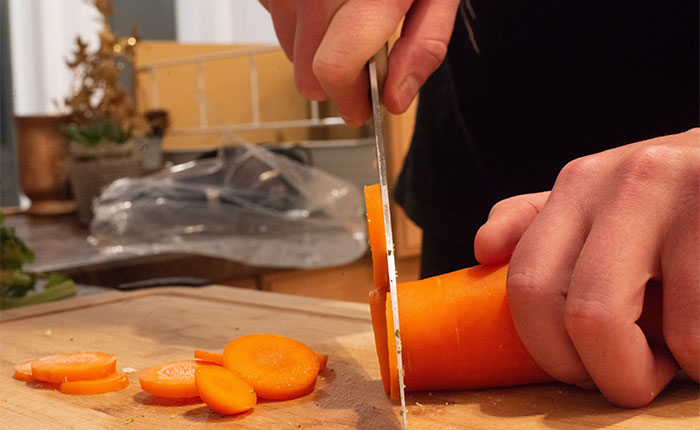 Learning proper knife safety and knife skills aren't all about chopping things as quickly or impressively as possible — when you know how to use a knife properly, you'll also save a lot of effort and make yourself far less prone to injuries
Learning proper knife safety and knife skills aren't all about chopping things as quickly or impressively as possible — when you know how to use a knife properly, you'll also save a lot of effort and make yourself far less prone to injuries -
17.
 Don't overthink your recipes. Instead of trying to make everything as fancy as possible (and use as many impressive ingredients as you can), just learn how to shop for quality ingredients. Food doesn't have to be fancy or complicated to taste good. A simple recipe made with quality ingredients and proper technique is almost always better than being fancy
Don't overthink your recipes. Instead of trying to make everything as fancy as possible (and use as many impressive ingredients as you can), just learn how to shop for quality ingredients. Food doesn't have to be fancy or complicated to taste good. A simple recipe made with quality ingredients and proper technique is almost always better than being fancy -
18.
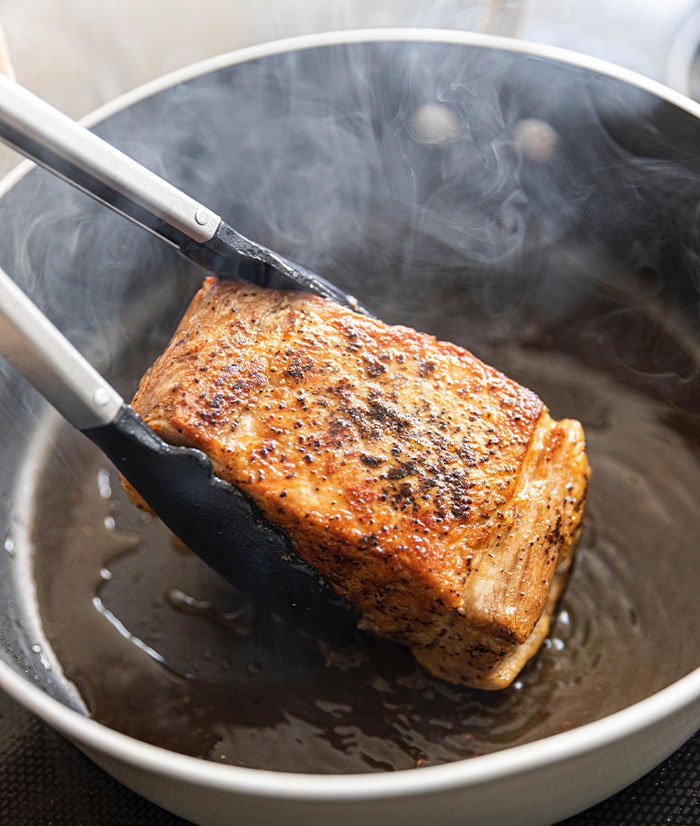 Steaks *continue* to cook even off the grill.
Steaks *continue* to cook even off the grill. -
19.
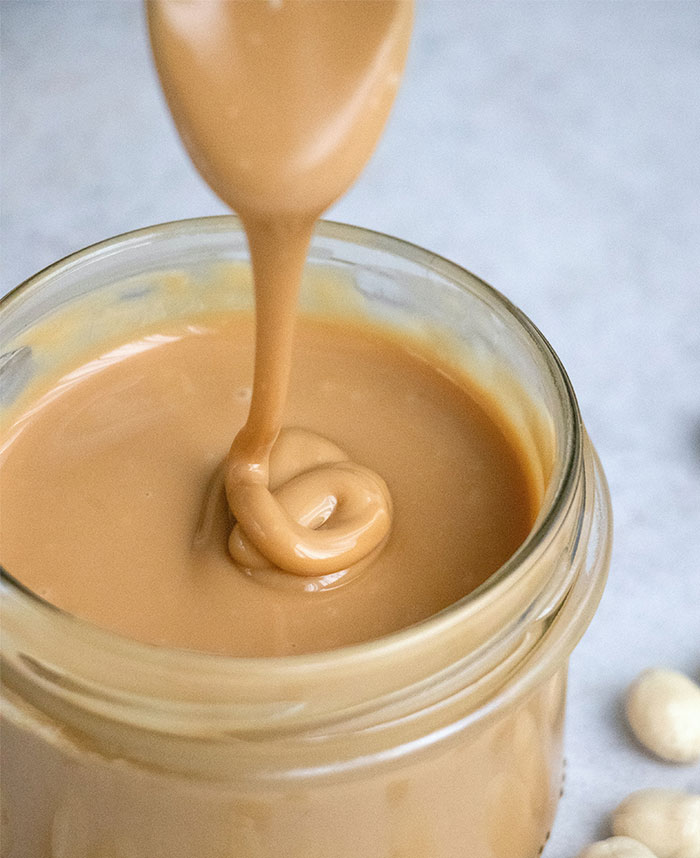 Peanut butter can really round out the flavour in sauces and stew-like dishes.
Peanut butter can really round out the flavour in sauces and stew-like dishes. -
20.
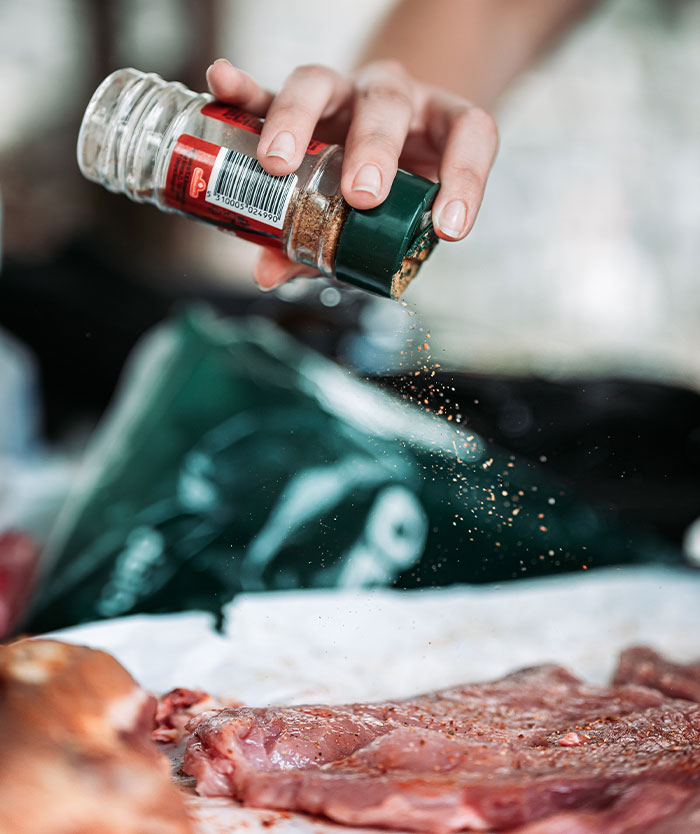 Season everything. Making chicken alfredo? Season the chicken, season the pasta, and season the sauce. Never assume that one flavor element will permeate the whole dish. The difference between a $1 plate of pasta and a $12 plate of pasta is putting the right amount of salt in the water
Season everything. Making chicken alfredo? Season the chicken, season the pasta, and season the sauce. Never assume that one flavor element will permeate the whole dish. The difference between a $1 plate of pasta and a $12 plate of pasta is putting the right amount of salt in the water -
21.
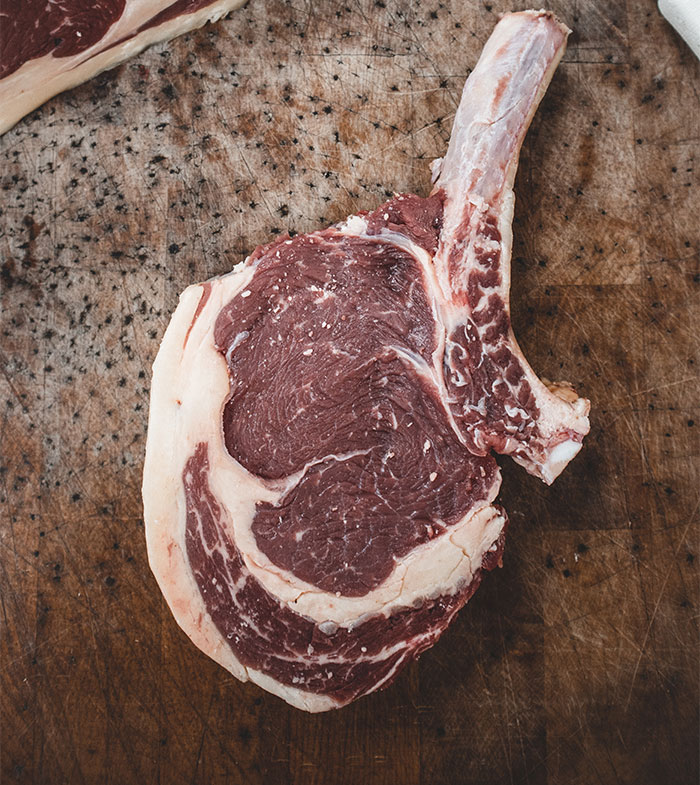 When making pork chops cut the ribbon of fat so that it is in pieces instead of one long piece. It prevents the chop from curling in the pan and cooking unevenly.
When making pork chops cut the ribbon of fat so that it is in pieces instead of one long piece. It prevents the chop from curling in the pan and cooking unevenly. -
22.
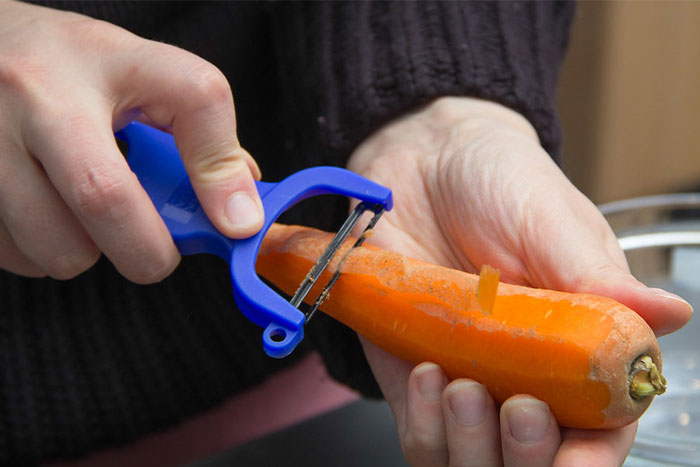 Peel your carrots. Not everything needs to be on high heat. A good chef knife will be the only tool you really need for home cutting. Save your bacon fat. Soups are the best way to use leftovers.
Peel your carrots. Not everything needs to be on high heat. A good chef knife will be the only tool you really need for home cutting. Save your bacon fat. Soups are the best way to use leftovers. -
23.
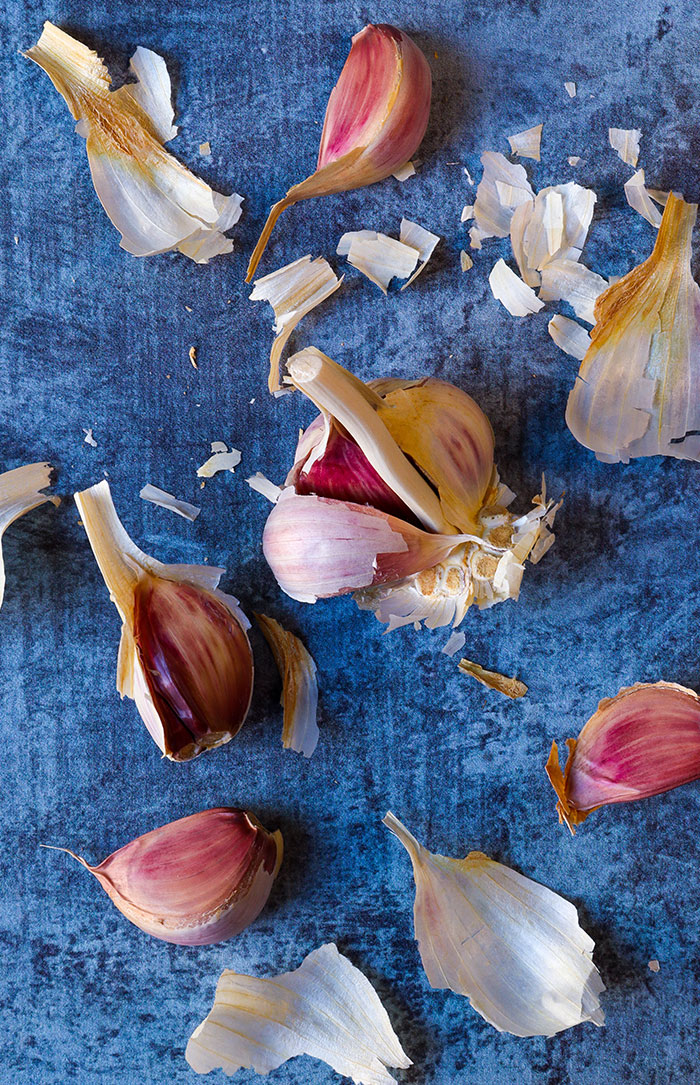 Garlic makes everything better.
Garlic makes everything better. -
24.
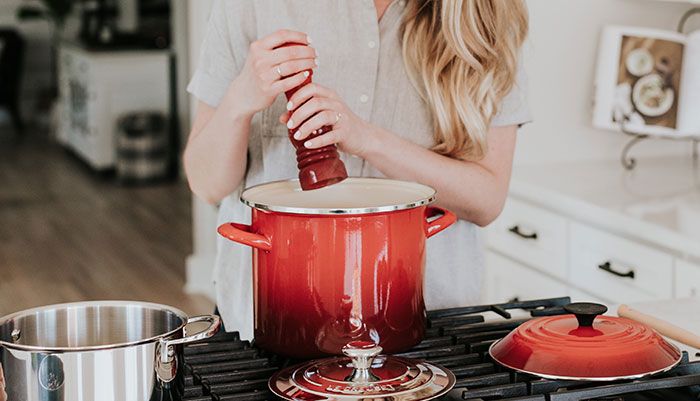 SALT. My god salt your food. If there is one mistake that home cooks make, and then wonder why it doesn't taste as good as a restaurant, it is usually too little salt. Salt opens up the receptors on your tongue and enhances the flavor of pretty much everything. Easiest example is salting the water you would use to boil any starch (pasta, potatoes, etc). You should put **a lot** of salt in the water. Think about how much you would consider a lot, then double it, and add that much. This is the best time to season any starch, when it is boiling. Then adjust the flavor (add more) if needed once it is cooked.
SALT. My god salt your food. If there is one mistake that home cooks make, and then wonder why it doesn't taste as good as a restaurant, it is usually too little salt. Salt opens up the receptors on your tongue and enhances the flavor of pretty much everything. Easiest example is salting the water you would use to boil any starch (pasta, potatoes, etc). You should put **a lot** of salt in the water. Think about how much you would consider a lot, then double it, and add that much. This is the best time to season any starch, when it is boiling. Then adjust the flavor (add more) if needed once it is cooked. -
25.
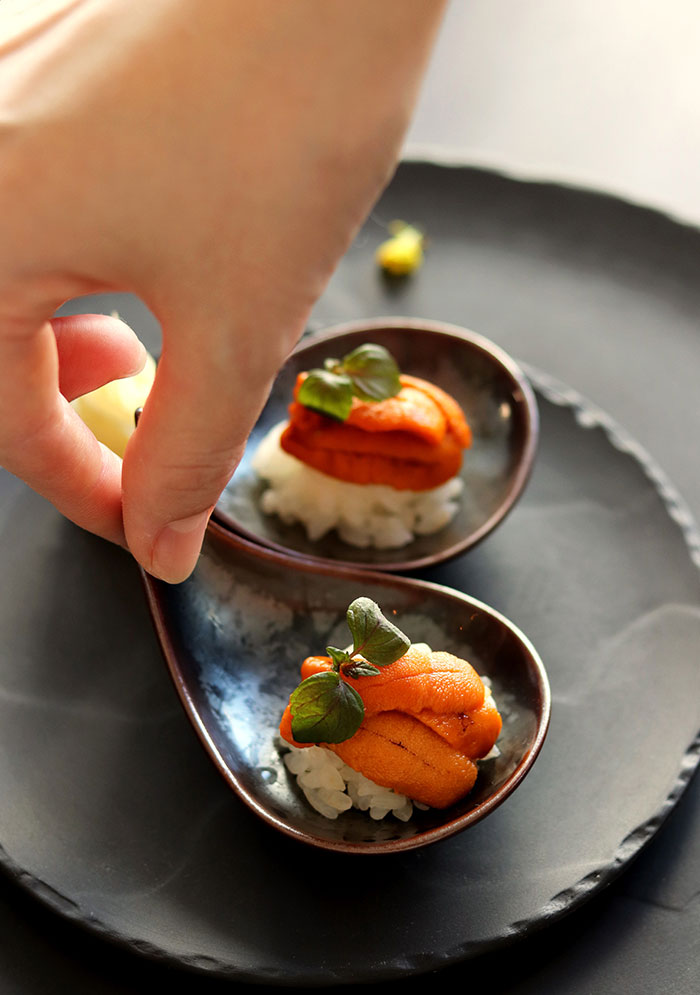 **1. Pay attention to plating.** A nice, clean, warm plate can make the difference between an OK meal, and a great meal. Most restaurants I've worked in aren't serving anything special, they just serve it in a way that makes it *look* special. If you treat your homemade stuff like it was in a five-star restaurant, you can make Hamburger Helper taste like scratch-made casserole. **2. Read recipes completely, and prepare before starting.** Don't start cooking until your mise en place is completely squared away. Get out ever knife, tool, and pan you will need. Measure out all of your ingredients, and put all of them on the counter next to your stove. When you are on step 1 of your recipe, you should know what steps 2 and 3 are. With most recipes, you don't have time to go back to the cookbook to double-check what you're doing while your chicken dries up into leathery bits in the pan. Plan ahead, and make sure you're ready to *finish* your dish before you start it. **3. A good sauce can save almost anything.** Learn how to cook at least three sauces from memory with every day ingredients. A red wine sauce (cup or so of red wine, some butter, salt, onions and pepper) can turn any cheap steak into a great meal. Simple marinara can be made for under $10 bucks, and is just as good as the $20 pasta you get at Maggiano's. Find some recipes you like, and memorize them. **4. Season Everything.** Cooking chicken alfredo? Season the chicken, season the pasta, season the sauce. Never assume that one flavor element will permeate the whole dish. The difference between a $1 plate of pasta and a $12 plate of pasta is putting the right amount of salt in the water. While we're on the subject... **5. Taste Everything.** Taste everything, all the time. Good Italian chefs taste the pasta water before they drop the noodles. Taste your sauce every time you add to it. Never throw things in a pan and "wait to see" what happens. You should know what your dish will taste like *before* it hits the plate. **Edits:** * Don't taste boiling pasta water. I have seen life-long chefs do this, and it boggles my mind. * Always keep a good French cookbook in your kitchen. The French are known for their food for very good reasons. * Unless you're baking, recipes are guidelines, not infallible rules. Once you are comfortable with the basics of cooking, apply those skills to your own original ideas. Use cookbook recipes as jumping-off points for ingredients you really like.
**1. Pay attention to plating.** A nice, clean, warm plate can make the difference between an OK meal, and a great meal. Most restaurants I've worked in aren't serving anything special, they just serve it in a way that makes it *look* special. If you treat your homemade stuff like it was in a five-star restaurant, you can make Hamburger Helper taste like scratch-made casserole. **2. Read recipes completely, and prepare before starting.** Don't start cooking until your mise en place is completely squared away. Get out ever knife, tool, and pan you will need. Measure out all of your ingredients, and put all of them on the counter next to your stove. When you are on step 1 of your recipe, you should know what steps 2 and 3 are. With most recipes, you don't have time to go back to the cookbook to double-check what you're doing while your chicken dries up into leathery bits in the pan. Plan ahead, and make sure you're ready to *finish* your dish before you start it. **3. A good sauce can save almost anything.** Learn how to cook at least three sauces from memory with every day ingredients. A red wine sauce (cup or so of red wine, some butter, salt, onions and pepper) can turn any cheap steak into a great meal. Simple marinara can be made for under $10 bucks, and is just as good as the $20 pasta you get at Maggiano's. Find some recipes you like, and memorize them. **4. Season Everything.** Cooking chicken alfredo? Season the chicken, season the pasta, season the sauce. Never assume that one flavor element will permeate the whole dish. The difference between a $1 plate of pasta and a $12 plate of pasta is putting the right amount of salt in the water. While we're on the subject... **5. Taste Everything.** Taste everything, all the time. Good Italian chefs taste the pasta water before they drop the noodles. Taste your sauce every time you add to it. Never throw things in a pan and "wait to see" what happens. You should know what your dish will taste like *before* it hits the plate. **Edits:** * Don't taste boiling pasta water. I have seen life-long chefs do this, and it boggles my mind. * Always keep a good French cookbook in your kitchen. The French are known for their food for very good reasons. * Unless you're baking, recipes are guidelines, not infallible rules. Once you are comfortable with the basics of cooking, apply those skills to your own original ideas. Use cookbook recipes as jumping-off points for ingredients you really like. -
26.
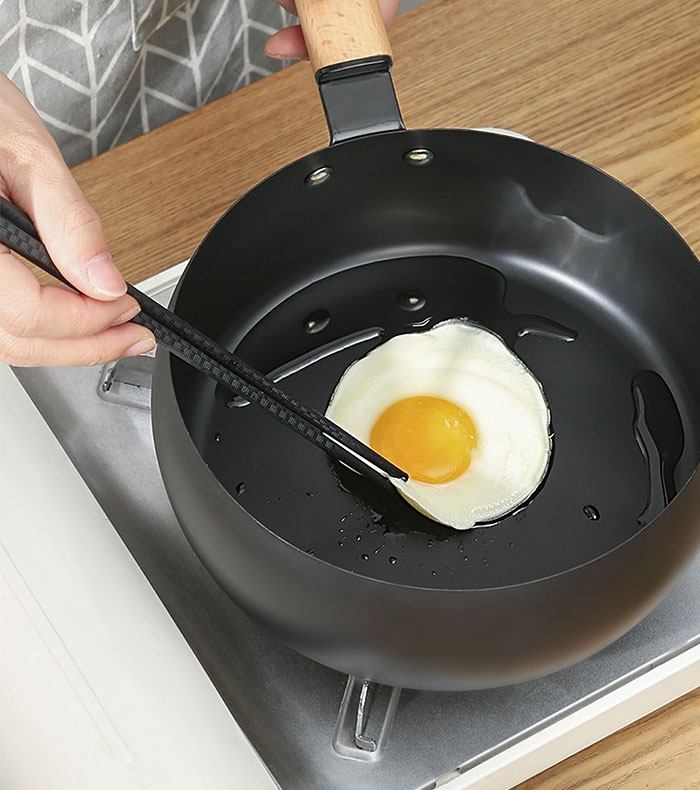 Cold oil, hot pan, foods won't stick.
Cold oil, hot pan, foods won't stick. -
27.
 Using your dominant hand, touch your pointer finger to the muscle at the base of your thumb, on the palm. The fleshy part that you can move freely. When you use your pointer finger and press down on that muscle, that is rare. Middle Is medium rare Ring is medium Pinky is Well Done. (Don't ever cook meat to well done.)
Using your dominant hand, touch your pointer finger to the muscle at the base of your thumb, on the palm. The fleshy part that you can move freely. When you use your pointer finger and press down on that muscle, that is rare. Middle Is medium rare Ring is medium Pinky is Well Done. (Don't ever cook meat to well done.) -
28.
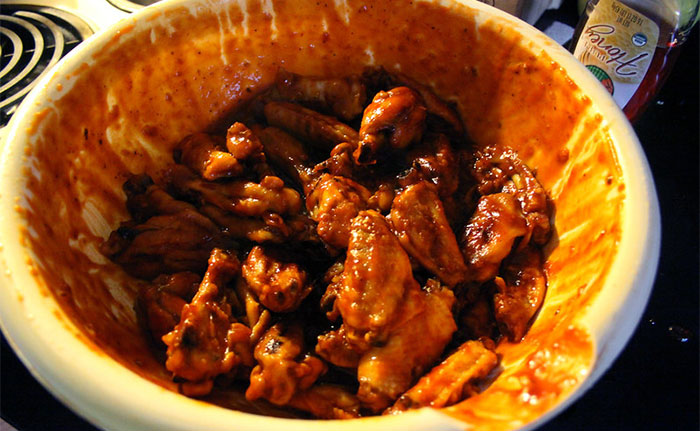 If you swirl the hot wings around in the bottom of the sauce bowl for about eight seconds before tumbling them, the oil in the sauce (butter - what have you) breaks down in the heat first and you get a better coverage when you tumble / flip them.
If you swirl the hot wings around in the bottom of the sauce bowl for about eight seconds before tumbling them, the oil in the sauce (butter - what have you) breaks down in the heat first and you get a better coverage when you tumble / flip them. -
29.
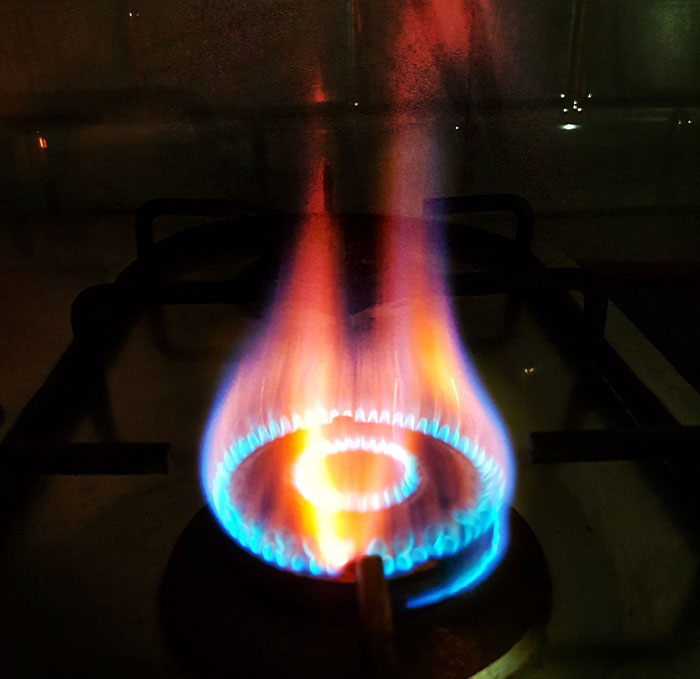 Im no professional, but in my years of cooking i've found that NOT EVERYTHING NEEDS TO BE COOKED ON HIGH.
Im no professional, but in my years of cooking i've found that NOT EVERYTHING NEEDS TO BE COOKED ON HIGH. -
30.
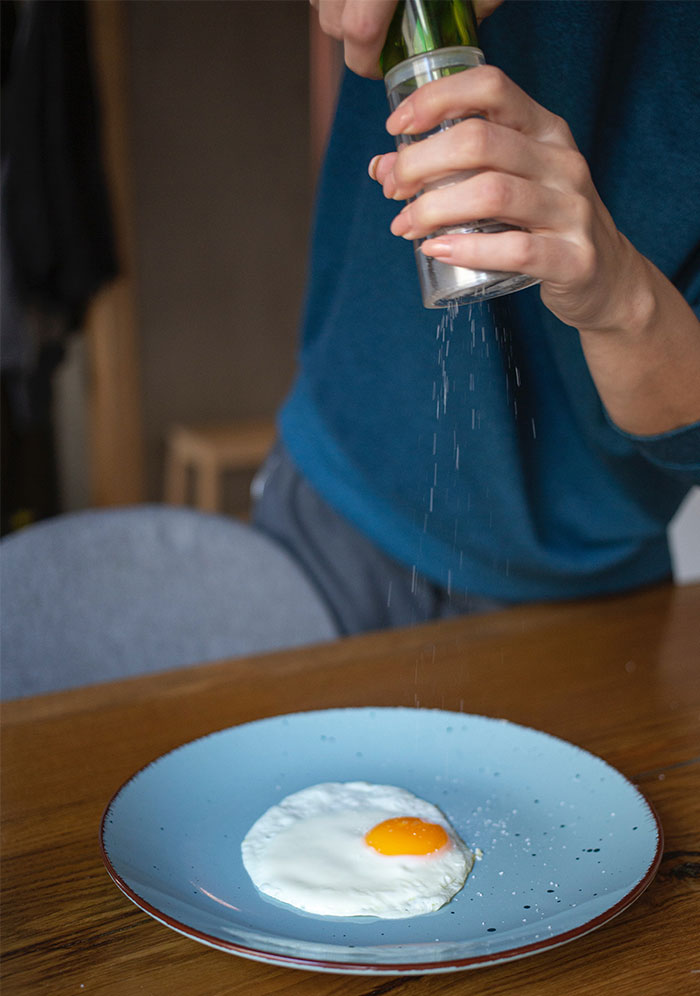 Kosher salt is far better to cook with than iodized salt, and is considered the gold standard in most kitchens. It's also less 'salty' than some other kinds of salts, so it's more forgiving and makes you less likely to over-salt something in the first place
Kosher salt is far better to cook with than iodized salt, and is considered the gold standard in most kitchens. It's also less 'salty' than some other kinds of salts, so it's more forgiving and makes you less likely to over-salt something in the first place
- NEXT GALLERY
-

- 51 Fun Photos to Enjoy Your Weekend Right
Don't cook bacon naked. (microwaving is fine)
30/30
1/30
Categories:
Wow






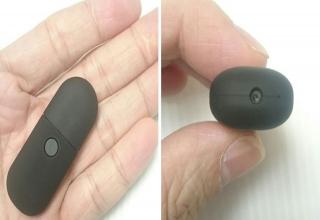
1 Comments